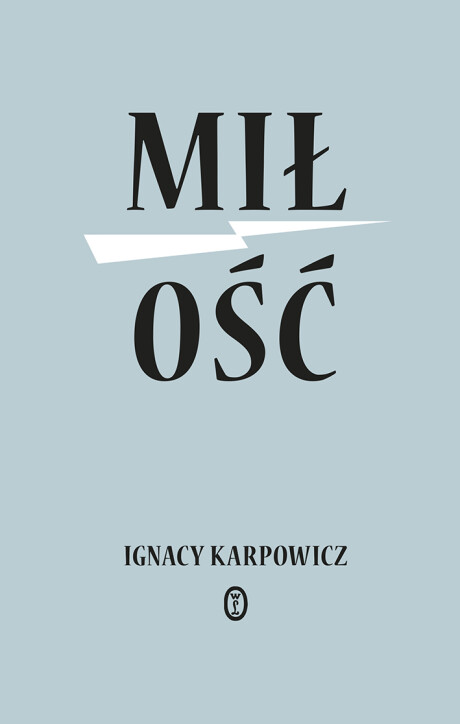Miłość
Ignacy Karpowicz
Love is a remarkable Chinese-box novel taking place in three time periods – a stylized prewar Polish manor (a motif modeled on the biography of Jarosław Iwaszkiewicz, one of Poland’s major twentieth-century writers), a dystopian late twenty-first-century reality where Poland is an authoritarian and homophobic country and every step outside the conservative/nationalist norm is severely punished, and a fairy-tale world – the only place where goodness is possible. All three plots touch upon the central issue of love – hidden, secret, often conflicting with the prevailing norms and laws. Each of the men in the novel denies himself the right to happiness and fulfillment in a homosexual relationship. In this highly autobiographical novel, Karpowicz has managed to depict a brutal world ruled by a thoughtless and insensitive tyrant, in which the highest price is paid for love. Although this novel juggles literary conventions with effortless skill, it can also be read as a pained portrait of modern-day Poland, where the demons of chauvinism and intolerance are growing dangers to us all.
“Ignacy Karpowicz’s Love is an absolutely exceptional novel. The fairy-tale part is a master-stroke, the imitations of prewar speech are a delight, the inventiveness in creating a Poland severed from the world should put our science-fiction writers to shame”.
Dariusz Nowacki, Gazeta Wyborcza
“How to speak of love without making it a literary cliché, a cultural gadget, an emotional duty, a nauseating hodge-podge of words and gestures? How to come a hair’s-breadth from this most intimate of experiences without betraying its intimacy? For Ignacy Karpowicz, the response is: through literature”.
Paweł Goźliński, Książki. Magazyn do czytania
“Love, with all its imperfections and inadequacies, is a novelist’s gesture of renewal. The writer has drawn from psychological realism, from dystopias and fairy-tales, thus indicating genres to be revitalized – basic forms, as it were. They all place the writer before the necessity of cutting through language to elementary truths: intimacy in psychological realism, a dystopian power structure hidden beneath the surface of normalcy, and a belief in fairy-tales”.
Przemysław Czapliński
“Karpowicz’s Love is an atypical sort of novel, a conglomerate of sorts. The protagonists’ misty imaginings imperceptibly blend with their reality. Dream is prophecy, revealing the deepest longings. All the tales are intercut, they contain the same core. Names and reflections are repeated, as are, above all, yearnings, the intense need for love and the desire to be loved. Karpowicz offers moving evidence that ‘the world without love is a dead world and the time always comes when a tired person begs to see the face and a heart of a creature illumined by love.’”
Agata Bednarek, O.pl
“Love is, to some degree, a challenge, but it is mainly a book that diagnoses universal human problems – with a great deal of tact and empathy, without imposing its own opinions or excessive philosophizing. It is well worth reading, though its diversity will keep you on your toes.”
Krytycznym okiem
Pages: 292
ISBN: 978-83-08-06410-8
Rights sold: Slovenia (Skuc)
Request manuscript
Love
Ignacy KarpowiczLove is a remarkable Chinese-box novel taking place in three time periods – a stylized prewar Polish manor (a motif modeled on the biography of Jarosław Iwaszkiewicz, one of Poland’s major twentieth-century writers), a dystopian late twenty-first-century reality where Poland is an authoritarian and homophobic country and every step outside the conservative/nationalist norm is severely punished, and a fairy-tale world – the only place where goodness is possible. All three plots touch upon the central issue of love – hidden, secret, often conflicting with the prevailing norms and laws. Each of the men in the novel denies himself the right to happiness and fulfillment in a homosexual relationship. In this highly autobiographical novel, Karpowicz has managed to depict a brutal world ruled by a thoughtless and insensitive tyrant, in which the highest price is paid for love. Although this novel juggles literary conventions with effortless skill, it can also be read as a pained portrait of modern-day Poland, where the demons of chauvinism and intolerance are growing dangers to us all.
“Ignacy Karpowicz’s Love is an absolutely exceptional novel. The fairy-tale part is a master-stroke, the imitations of prewar speech are a delight, the inventiveness in creating a Poland severed from the world should put our science-fiction writers to shame”.
Dariusz Nowacki, Gazeta Wyborcza
“How to speak of love without making it a literary cliché, a cultural gadget, an emotional duty, a nauseating hodge-podge of words and gestures? How to come a hair’s-breadth from this most intimate of experiences without betraying its intimacy? For Ignacy Karpowicz, the response is: through literature”.
Paweł Goźliński, Książki. Magazyn do czytania
“Love, with all its imperfections and inadequacies, is a novelist’s gesture of renewal. The writer has drawn from psychological realism, from dystopias and fairy-tales, thus indicating genres to be revitalized – basic forms, as it were. They all place the writer before the necessity of cutting through language to elementary truths: intimacy in psychological realism, a dystopian power structure hidden beneath the surface of normalcy, and a belief in fairy-tales”.
Przemysław Czapliński
“Karpowicz’s Love is an atypical sort of novel, a conglomerate of sorts. The protagonists’ misty imaginings imperceptibly blend with their reality. Dream is prophecy, revealing the deepest longings. All the tales are intercut, they contain the same core. Names and reflections are repeated, as are, above all, yearnings, the intense need for love and the desire to be loved. Karpowicz offers moving evidence that ‘the world without love is a dead world and the time always comes when a tired person begs to see the face and a heart of a creature illumined by love.’”
Agata Bednarek, O.pl
“Love is, to some degree, a challenge, but it is mainly a book that diagnoses universal human problems – with a great deal of tact and empathy, without imposing its own opinions or excessive philosophizing. It is well worth reading, though its diversity will keep you on your toes.”
Krytycznym okiem
Pages: 292
ISBN: 978-83-08-06410-8
Rights sold: Slovenia (Skuc)



